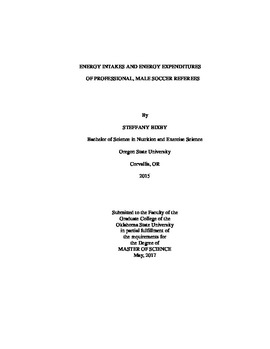| dc.description.abstract | Objective: The purpose of this study is to explore if professional, male soccer referees meet their energy intake recommendations based upon energy prediction equations. The secondary purpose of the study is to determine if there are comparisons between anthropometric data and their energy intake, energy expenditure, and distance traveled during a game.Methods: Thirteen male soccer referees (aged 24-47) refereeing for Major League Soccer (MLS) completed the study. Information was provided about their age, height, weight, and body fat percentage; and from that information, their BMI and fat free mass were determined. The referees kept a 4-day food diary to determine energy intake. Their energy expenditure (kcals) and distance traveled (km) were recorded through GPS watch and heart rate monitor during a professional game in which the referee was the center/main referee. The energy consumption was analyzed with SuperTracker to determine energy intake. Energy needs were predicted by applying their age, height, weight, and fat free mass to the Harris-Benedict, Mifflin St. Jeor, and Cunningham metabolic equations.Results: The average kilocalories consumed by the referees during the four day period was approximately 1887 ± 427.5. This was significantly less than each metabolic equations predicted the referees would need for their activity level. The results found no association between kilocalories consumed, energy expenditure, and distance traveled when compared to age, BMI, and body fat percentage. This study found that referee’s energy intake was significantly lower than predicted energy recommendations from all three metabolic equations with activity factors. At an activity factor of 1.7, the Mifflin St. Jeor predicted energy needs closest to what the referees actually consumed.Conclusion: This lower energy consumption might have an effect on their performance while refereeing. Their ability to think quickly could be negatively affected by their low energy consumption as well as their recovery time. In the future, an energy consumption recommendation for referees based on their activity level should be developed. | |
